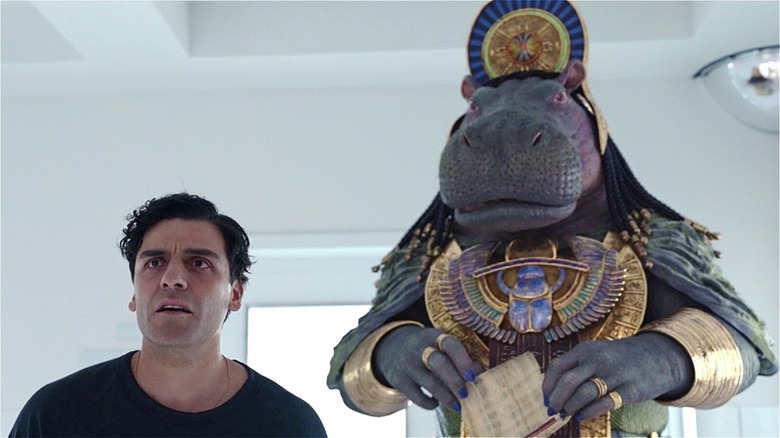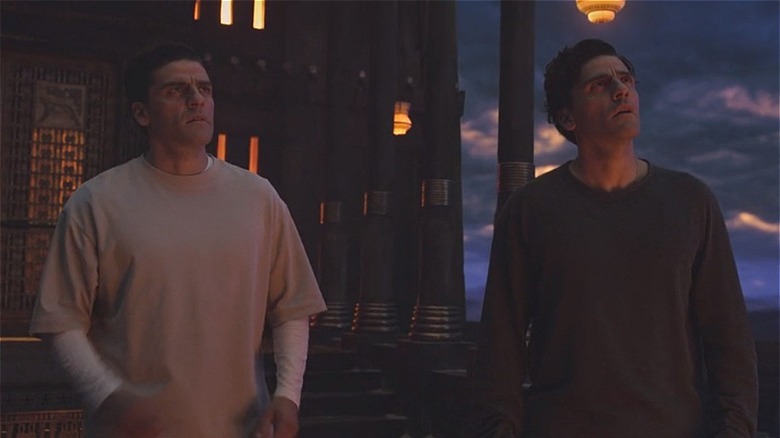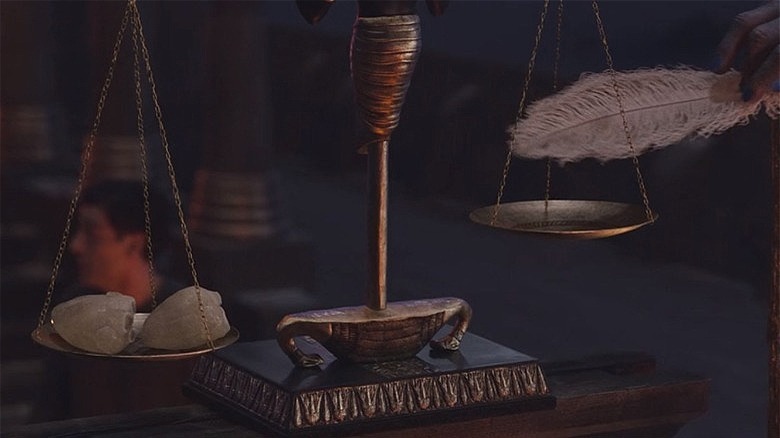Moon Knight And The Rules Of The Egyptian Afterlife, Explained
This post contains spoilers for the latest episode of "Moon Knight."
Mohammed Diab is back to helm the remaining episodes of "Moon Knight" after the delightful Justin Benson and Aaron Moorhead spectacle of episode 4, and the latest episode, "The Asylum," digs deeper into Egyptian history and mythology, in ways instrumental to the plot. Episode 5 unravels as a journey to the Egyptian underworld, or Du'at, wherein Marc and Steven (Oscar Isaac) need to journey through this realm with the help of Goddess Taweret, the mild-mannered hippo we saw at the end of episode 4.
The episode opens with Taweret confirming that Marc and Steven are indeed dead and that she is here to help guide their journey through the underworld to the Egyptian afterlife. This process entails the balancing of their hearts on a scale against the feather of Ma'at, and that their souls will be allowed to pass on to the Field of Reeds, which can be likened to the idea of heaven if the scales balance and they are proven to be worthy. If not, they will be consumed by the souls of the unworthy and turned into stone on the sands that surround the passage.
The key to balancing the scale is to delve deeper into Marc's psyche, and him opening up to Steven about the life he has led so far. This, of course, is a difficult, traumatic undertaking for both, and this race against time adds urgency to the plot. However, much of the Egyptian mythology in "Moon Knight" is true, and what aspects have been altered to better serve the narrative? While I'm no Egyptologist, here's a breakdown of the key concepts that surround the Egyptian underworld and the afterlife.
No two journeys through the underworld are alike
At the beginning of the episode, Taweret clarifies that this is not the afterlife, but an afterlife, as different planes of "untethered consciousness" can exist at the same time. As Marc and Steven's psyches have reimagined their version of the afterlife as the Putnam Psychiatric Ward, they need to navigate their consciousness via that modeled plane of reality, or unreality.
This is in line with Egyptian mythology — as per the Canadian Museum of History, ancient Egyptians theorized that the departed souls were subjected to various kinds of passages during their journey through the underworld, and the choice of their route was dependent on their status. While status does not really play a role in the series the way the ancient Egyptians interpreted the term, the journey is a psychological one, as opposed to one that is dictated by material or societal status preceding death.
Notable omissions for the sake of the narrative include the burial rites carried out to prepare a soul for the journey, and as Marc/Steven was shot by Harrow, and this aspect does not fit in with the events that play out, it makes sense for them to directly land into this realm. Nevertheless, the journey to the un underworld was always considered a precarious one under any circumstance, as the realm was inhabited by dangerous beings and successful passing entailed entry through all seven gates. What we see is a rather simplified aspect of the process, with the destination being the same as the one in ancient mythology: the Hall of Osiris.
Balancing the scales of Ma'at
It is believed that the Hall of Osiris was the site of the judgment for the souls, where the weighing ritual was overseen by Anubis, while the judgment was recorded by Thoth. While Osiris and Thoth are missing from this particular sequence, we see Taweret instead, the goddess of rebirth and fertility, who gently guides them through the process. However, she does mention Osiris' gateway to the world as we know it, and although it seems to be something that has never been done before, she was ready to make an exception in this case, considering the imbalance Harrow ushered in via his preemptive judgment of souls (and murder).
The weighing ritual in itself lines up with ancient Egyptian beliefs — the person's heart was placed to counterbalance a feather that represented Ma'at, the goddess of truth and justice. If the scales balanced, the person was worthy of immortality, and if not, they would be consumed by Amenet, who, as per the show's iteration, is Ammit. As Ammit was banished by the Ennead, it makes sense for the unworthy souls (who Marc had killed when alive) to want to drag him with them, consuming him in a certain sense of the term.
Apart from this, there are many complex concepts surrounding the Egyptian concept of the soul — such as how the soul was not a single, but unified entity — but the key takeaway is that these concepts are in sync with the belief that a person continues to live on after death until judgment is passed. We see Marc in the Field of Reeds by the end, meaning he has passed the test, and can possibly find a way to return with Taweret, Layla, and Khonshu's aid, but I'm not sure as to how Steven might return (although he should), given how he was frozen on the sands of the underworld.
As the actual process of the Egyptian passage to the underworld is two-fold, wherein souls who pass the weighing process are subject to a hearing by a pantheon of Egyptian gods, will this aspect play out in the "Moon Knight" season finale in some capacity? Only time will well. Here's hoping that Marc and Steven find a way back to the world, and thwart Harrow's diabolical plan before it is too late.
"Moon Knight" is currently streaming on Disney+.


